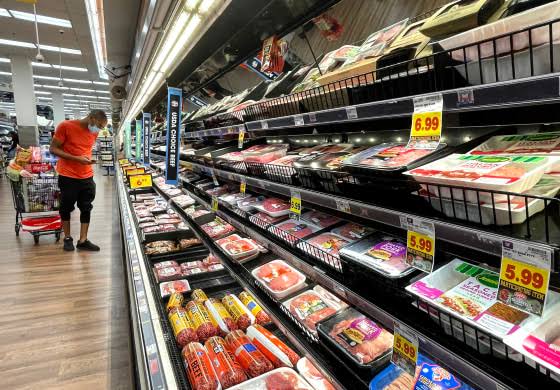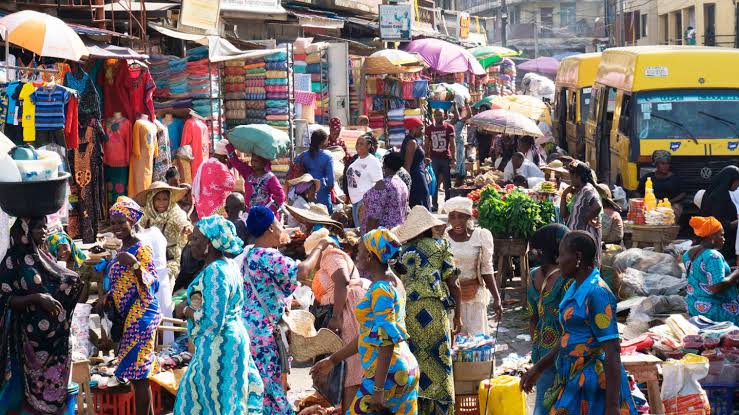Before the Nigerian economy took a sharp and sustained downturn, shopping at superstores was not just about purchasing essentials; it was a lifestyle that many Nigerians indulged in with pleasure.
These large retail outlets became more than just places to buy groceries; they were spaces where people took photos to show-off their day’s activities or simply enjoy some leisure time.
The long queues at these stores were almost a given, with customers patiently waiting their turn at the cash registers, often wondering how long it would take to get through.
However, a recent visit by journalists to various supermarkets and shopping malls paint a very different realistic picture from the bustling activity of the past. The once busy malls, packed with shoppers looking for deals and essentials, are now noticeably less crowded.

The era of Nigerians flocking to big malls and supermarkets for basic needs seem to be over. Instead, more people are turning to local wholesale shops, where they can buy the same goods at lower prices and avoid the lengthy queues.
Mrs. Akinade Temitope, a banker, shared her experience of how she now prefers to shop at local stores rather than the big supermarkets she used to frequent.
“Everybody knows the prices of goods in the market are high,” she said. “But when you go to some supermarkets, it is ridiculous. Up to the price of bread, which is sold for N1,200. In bakeries outside supermarkets, the size of bread goes for N800. Who would know such and still decide to patronize the former?”
She went on to highlight the price differences that drove her away from shopping malls. “Ordinary Maggi small sachet is N380 in supermarkets, and a roll of 10 is N3,800 when I can get such at N3,000 in local shops.
“With the way businesses are crawling, salaries not increasing, and expenses piling up every day, one will need to change lifestyle.
“So, I decided to stop visiting the shopping malls and instead get my groceries at cheap prices in wholesale stores. This simple change in lifestyle has helped me cut costs a lot.”
Mrs. Monica Adams, a teacher who used to shop at supermarkets every weekend, echoed a similar sentiment. She now opts for smaller local shops, where she can buy her groceries in smaller quantities at more affordable prices.
“Before, I shopped in malls and supermarkets. But now, I don’t because of the rise in prices; I just decided to patronize local stores.
I can’t even buy the large quantity of food items I usually buy in these malls anymore. Now I just purchase what my money can afford.”

She also mentioned that the queues in these malls, particularly on weekends, have dwindled. “Those queues in the shopping malls and supermarkets, especially on the weekends, have reduced. Try to visit one, and you will see for yourself,” she added.
Yet, despite the shift in shopping habits, some people still frequent supermarkets for items that are hard to find in local stores.
Mr. Victor Oshinaike is one of those individuals. “I only visit the supermarket whenever there is an item I can’t find in the local market,” he explained. “I am a top fan of supermarkets because I don’t like moving about the local markets to get different items. But I don’t mind moving now to cut costs.”
He also emphasized how everyone, regardless of their gender, is now concerned with saving money, “it is before people say men don’t price. Now men are very conscious of the prices of goods and also look for where to get these goods at a very cheap price. There is no rich man in Nigeria; the rich also cry.”
Miss Kenny Boma, a pharmacist, also shared how her family had to change their shopping habits due to the rising costs.
“My family and I have shopped for groceries every month in shopping malls for years now, but for two months, we have not been able to do so anymore.
We now go to local markets to get things needed and manage. Apart from the cost, nobody has spare cash to do lots of shopping these days. Everyone is managing. They only go for basic things now.”
The story of reduced patronage extends beyond supermarkets to bakeries as well.
Shalewa Ogunsanya, a hair vendor, recounted her recent experience. “The queue in shopping malls used to give me trauma. For so many reasons, I hated it there, but they are the only stores where you can find all your groceries at once. I went to a particular one last week and was worried about the queue. To my surprise, there was no one in the queue when I got to the cashier’s counter.”
Curious, she asked the cashier why there were no crowds on a weekend, to which the cashier replied, “Things are so expensive, and not everyone can afford them in this economy. We are also being affected by poor sales too.”
Shalewa’s experience didn’t end there. She later visited a popular bakery known for its large customer base. “I visited a popular bakery to buy bread the same day. This bakery was also filled with customers who were always in queue. But that day, there was nothing as such. The attendant told me that they have even reduced their production size to avoid losses.”
It is clear that Nigeria’s economic challenges are not only affecting individual households but also the businesses that rely on consumer spending.
As prices continue to rise and incomes remain stagnant, Nigerians are being forced to make difficult choices in their spending habits.
The allure of big shopping malls and supermarkets is fading as more people turn to local stores in search of better deals and fewer queues.
While some may still frequent supermarkets for hard-to-find items, the general trend suggests that Nigerians are becoming more frugal in their shopping habits, focusing on essentials and seeking ways to stretch their limited resources.
The shift in consumer behavior is a direct result of the ongoing economic downturn, and it seems unlikely that the situation will change anytime soon. As Mrs. Temitope pointed out, “With businesses crawling, salaries not increasing, and expenses piling up every day, one will need to change lifestyle.” For many Nigerians, that change has already begun.


































